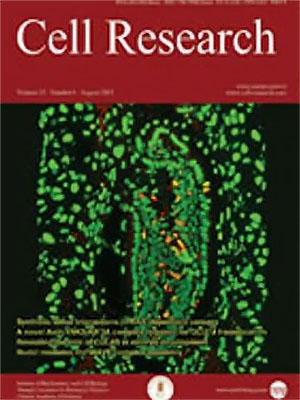
Volume 13, No 4, Aug 2003
ISSN: 1001-0602
EISSN: 1748-7838 2018
impact factor 17.848*
(Clarivate Analytics, 2019)
Volume 13 Issue 4, August 2003: 301-308
ORIGINAL ARTICLES
Cloning and molecular characterization of a novel lectin gene from Pinellia ternata
Jian Hong YAO1, Xiu Yun ZHAO1, Zhi Hua LIAO1, Juan LIN1, Zhong Hai CHEN1, Fei CHEN1, Jun SONG1, Xiao Fen SUN1, Ke Xuan TANG1,2,*
1State Key Laboratory of Genetic Engineering, School of Life Sciences, Morgan-Tan International Center for Life Sciences, Fudan-SJTU-Nottingham Plant Biotechnology R and D Center, Fudan University, Shanghai 200433, China
2Fudan-SJTU-Nottingham Plant Biotechnology R and D Center, Plant Biotechnology Research Center, School of Agriculture and Biology, Shanghai Jiaotong University, Shanghai 200030, China
Correspondence: Ke Xuan Tang(kxtang1@yahoo.com or kxtang1@sohu.com)
The full-length cDNA of Pinellia ternata agglutinin (PTA) was cloned from inflorescences using RACE-PCR. Through comparative analysis of PTA gene (pta) and its deduced amino acid sequence with those of other Araceae species, pta was found to encode a precursor lectin with signal peptide and to have extensive homology with those of other Araceae species. PTA was a heterotetrameric mannose-binding lectin with three mannose-binding boxes like lectins from other Araceae and Amaryllidaceae species. Southern blot analysis of the genomic DNA revealed that pta belonged to a low-copy gene family. Northern blot analysis demonstrated that pta constitutively expressed in various plant tissues including root, leaf, stem and inflorescence. The pta cDNA sequence encoding for mature PTA protein was cloned into pET-32a plasmid and the resulting plasmid, pET-32a-PTA containing Trx-PTA fusion protein, was investigated for the expression in E. coli BL21. SDS-PAGE gel analysis showed that the Trx-PTA fusion protein was successfully expressed in E. coli BL21 when induced by IPTG. Artificial diet assay revealed that PTA fusion protein had significant levels of resistance against peach potato aphids when incorporated into artificial diet at 0.1% (w/v). The cloning of the pta gene will enable us to further test its effect in depth on aphids by transferring the gene into crop plants.
FULL TEXT | PDF
Browse 2108


